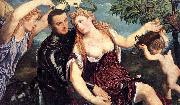|
|
|
|
|
Paris Bordone
|
|
Allegory_with_Lovers
|
|
1550_
Oil_on_canvas,_
111,5_x_174,5_cm
|
|
|
|
|
|

|
|
Click to Enlarge
|
| Paris_Bordone
|
Allegory with Lovers
new18/Paris Bordone-244953.jpg
|
|
|
|
|
|
| 1550
Oil on canvas,
111,5 x 174,5 cm |
|
|
Italian
1500-1571
Italian painter and draughtsman. He is best known for his strikingly beautiful depictions of women, both in portraits and in cabinet paintings. He also excelled in rendering monumental architectural settings for narrative, both religious and secular, possibly initiating a genre that would find great currency during the mid-16th century, especially in Venice, France and the Netherlands. His favoured media were oil and fresco, the latter being used on both interiors and faades. Although he was not generally sought after by Venetian patrons during his career, as his art was eclipsed by that of Titian, Paolo Veronese and Jacopo Tintoretto, Bordone was regarded in the mid-16th century as an accomplished artist (Pino; Sansovino). He worked for the moneyed lite of northern Italy and Bavaria, for the royalty of France and Poland, and had works commissioned to be sent to Spain and to Flanders. Despite knowledge of the important patrons for whom he worked, the chronology of Bordones oeuvre is by no means clear. Dating on stylistic grounds is confounded by the diverse sources on which he drew, ranging from the Emilian, Lombard and Venetian to the French and northern European, depending on the patron. Due to the ease with which prints circulated during Bordones career, it is difficult to ascertain whether influences were derived at first hand or from printed images. Such difficulties in assigning dates are further exacerbated by his use of the same figure study for numerous paintings evidently executed decades apart. Reliance on the testimony of Vasari, who interviewed Bordone in 1566, in conjunction with the extant documents, the few signed and dated paintings and, to a lesser extent, period fashion provides only a rough outline of his activity. Due to the lack of agreement among scholars regarding chronology, the following account is based mainly on the documentary evidence.
|
|
|
|
|
|
|